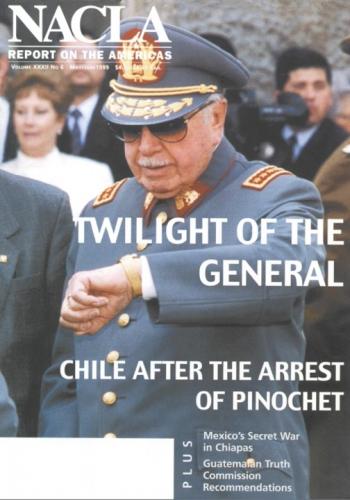Report
Baltasar Garzón, the Spanish judge who requested the arrest of Pinochet while he was visiting a London clinic, is spearheading an investigation of a shadowy Latin American military network created in the 1970s called Operation Condor.[1] Through Condor, associated Southern Cone militaries shared intelligence on political opponents—and seized, tortured and executed them—in cooperation with one another.
"In the United States, as you know, we are sympathetic with what you are trying to do here," then Secretary of State Henry Kissinger privately confided to the Chilean dictator, General Augusto Pinochet, in June 1976. At the height of the military regime's repression, according to a recently declassified memorandum of conversation, Kissinger told Pinochet that the junta was "a victim of all left-wing groups around the world" and that Washington "wishes you well."
For Chilean conservatives, limping along the road to a third consecutive defeat in presidential politics, Pinochet's arrest in London on October 16 struck like a double dose of Viagra. After more than a decade of squabbles about the future of the right, conservatives again stood tall and united in protection of the past.
Almost every year, Augusto Pinochet feels an overwhelming compulsion to visit London. The symptoms include the craving to have tea with the admired Baroness Thatcher and the desire to buy fine things at Harrods and to stay in elegant hotels.
In their efforts to sell privatization and deregulation in the United States, conservatives have found inspiration in the free-market extremism of the Chilean military dictatorship. "If Texas were Chile," reads the conclusion of a 1992 book, If Texas Were Chile: A Primer on Bank Reform, "there would be no Federal Deposit Insurance Corporation, no Federal Savings and Loan Insurance Corporation, no Resolution Trust Corporation for bailing out its financial system.
The October arrest of General Augusto Pinochet in Britain for having ordered thousands of murders and disappearances in Chile is destined to change the equation of political repression, regardless of the final result of Pinochet's legal appeals. The subsequent race by European countries to try the General shows how far we have come from the days when tyrants could terrorize their own populations, secure in the knowledge that at worst they would face a tranquil exile on some foreign golf course.
In December 1997, parliamentary elections were held in Chile to renew the entire Chamber of Deputies and half the elected seats in the Senate. These elections brought to light a disquieting trend: A growing number of citizens were opting not to exercise their right to vote.
On December 9, 1998, British Minister of the Interior Jack Straw ruled that General Pinochet could be extradited to Spain to stand trial on charges of murder, terrorism and genocide. By late that afternoon, a crowd of Pinochet supporters, outraged at Straw's decision, had gathered at the Alcántara metro stop in the upscale Santiago neighborhood of Las Condes.

